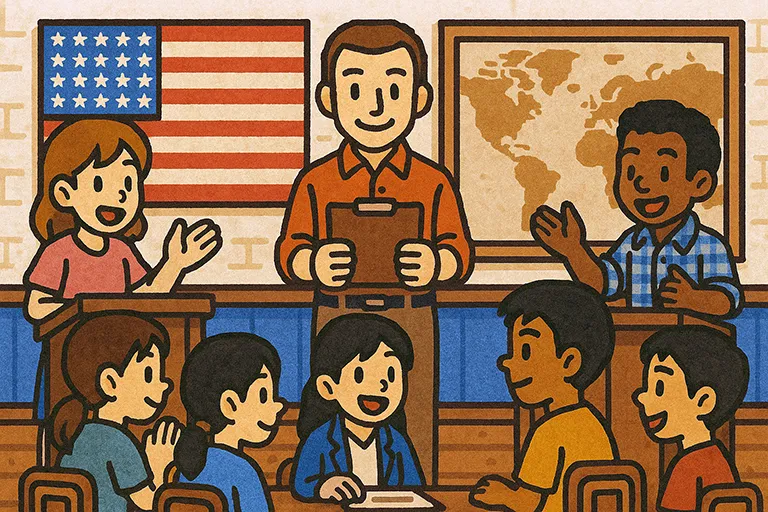Welcome to the ISA Curriculum Guide! This guide will help you teach your students about American government by turning your classroom into an exciting game.
Students will choose roles like party leader, candidate, citizen, or journalist. They’ll learn through activities such as mock elections, debates, and creating laws – making teaching civics fun and engaging for everyone.

How the Curriculum Works
The school year is split into two parts. In the first part, students learn how elections work by forming political parties and running campaigns. In the second part, they learn how the government creates laws and solves problems. Here’s how it looks:
Fall Semester: Learning, Parties, and Elections
- Weeks 1–2: Getting Started
- Explain the ISA game and set up student profiles.
- Students learn how game play will look depending on their chosen path – Party or Journalist.
- Students begin ELPS 101, learning about the history and foundation of Democracy and governance in the United States.
- Weeks 3–7: Learning and Practice
- Students continue to gain foundational knowledge about the U.S. Government, learning about levels of government, political structures, and primary and general elections.
- Students create pretend party platforms, campaign ads, and take quizzes.
- Students choose their path: Party or Journalist.
- Milestone: By Week 7, students should be at least halfway through ELPS 101 and should be gaining and deep and nuanced understanding of the American Political Process. This will make for meaningful game play.
- Weeks 8–10: Forming Parties
- Students learn how elections and political campaigns work.
- Students join and form political parties.
- Parties create their platforms and recruit members.
- Students continue with ELPS 101.
- Milestone: By Week 8, students unlock new activities by earning points.
- Milestone: By Week 10, everyone must join a party.
- Weeks 11–14: Campaigns and Debates
- Students run for office, debate, and campaign.
- Activities include mock interviews and practice elections.
- The teacher helps by moderating debates and giving advice.
- Milestone: By Week 14, students should have completed ELPS 101.
- Weeks 15–17: Elections
- Week 15 is for primary elections.
- Week 17 is for general elections, where students vote for their leaders.
- Milestone: By Week 17, elected students start their leadership roles.
Spring Semester: Leadership and Laws
- Weeks 18–20: Leadership Training
- New leaders learn how to govern.
- Activities include leadership training and creating new ideas for laws or projects.
- Students begin ELPS 201.
- Milestone: Leaders present their first ideas by Week 20.
- Weeks 21–26: Making Laws
- Weeks 21–23: Students work together to write proposals for new laws.
- Weeks 24–26: Students debate the proposals with teacher guidance.
- Milestone: By Week 26, all groups submit their laws for voting.
- Weeks 27–28: Voting and Governance
- Students vote on the proposed laws and see the results.
- They reflect on how their choices compare to real-world situations.
- Students complete ELPS 201.
End-of-Year Activities
- Weeks 29–32: Advanced Challenges
- Optional activities like solving mock crises or forming coalitions.
- Students practice more advanced skills.
- Weeks 33–36: Reflection and Wrap-Up
- Students discuss what they learned and share their experiences.
- Teachers help students reflect and complete final projects.
Key Milestones Recap
- Week 2: Students finish orientation and profiles.
- Week 7: Students complete the learning modules.
- Week 10: Every student joins a political party.
- Week 16: Elections finish and leadership roles begin.
- Week 20: Leaders share their first project or policy.
- Week 26: All laws are submitted and debated.
- Week 28: Students finish voting on laws.
Helpful Tips for Teachers
- Plan and Adapt:
This curriculum is flexible. Adjust activities and timing to best fit your class. Clear planning can help you easily lead each activity. - Support and Guidance:
Your role is important. Guide students through debates and activities. Give helpful feedback and encourage respectful discussions. - Assessment and Reflection:
Use quizzes and activities to check student progress regularly. At each milestone, ask students to think about what they’ve learned. - Real-World Connections:
Connect the game to current events in the news. This helps students see why civics matters in their daily lives. - Extra Resources:
Visit our website for more resources, lesson plans, and ideas to make your teaching easier.